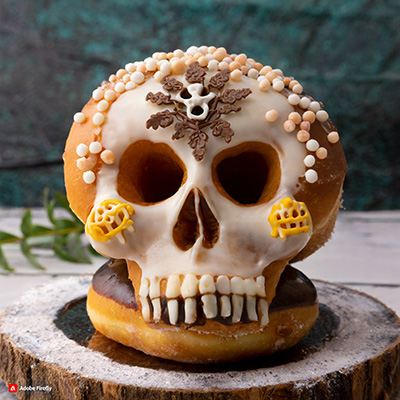
 In terms of bleak and reckless ways to bring in young drinkers, the legacy of the 2020s will almost certainly be the boozification of backyard brands. Alcoholic sodas are the most obvious form this trend takes, with everything from Coca-Cola to Mountain Dew to Monster Energy being sold in an ABV incarnation. The pitch for these products is that adults are clamoring for a product they loved as kids packaged with an intoxicating kick. Yet the key word here is “kids,” since if grown-ups loved Mountain Dew as kids, actual kids love it even more. All the more so since sugary beverage companies have fought for decades to make sure their vending machines are in elementary and high schools. And the trend keeps spreading: Dunkin’ Donuts, a company whose brand should be synonymous with mornings but has instead (for reasons that are beyond the reach of science) become synonymous with Ben Affleck, has rolled out an alcoholic version of its iced coffee.
Again, it cannot be emphasized too strongly: Dunkin’s signature product is a donut. A cheap dessert, that, by their own report, is favored by “families [and] students,” and whose afficionados skew young. This demographic is crucial to the alcohol industry. The younger someone starts drinking, the more likely they are to engage in disordered drinking when they are older–binge or heavy drinking patterns that are dangerous to them and lucrative for the industry.
Considering the financial stakes and the waning interest in alcohol displayed by younger generations, it should not be surprising that the industry surges for any excuse to initiate new drinkers. The resulting “ABV creep” continues to pull in more and more product lines. Not only does it threaten to result in an alcoholic version of every product youth have ever liked (the idea that an adult would eagerly lap up an alcohoic Sunny Delight embarrasses everyone involved), it creates immediate consumer confusion wherein both kids and adults could buy and try the alcoholic version by mistake.
The only thing that will stop boozey everyday products is burnout, and it’s quite possible the industry is heading that way. Certainly Ben Affleck seems exasperated. More concerning, however, is the breakdown of both social and regulatory norms allowing donuts and double whiskey sours to become synonymous. After all, identifying, exposing, and regulating tobacco industry strategies for drumming up youth interest turned out to be key to reining in the harms from cigarette smoking. The hope now is that communities, decisionmakers, and regulatory bodies will wake up to the Big Alcohol’s relentless quest for young livers.
READ MORE about how convenience store environments encourage youth use.
READ MORE about Big Soda’s rush to become Big Alcohol.
In terms of bleak and reckless ways to bring in young drinkers, the legacy of the 2020s will almost certainly be the boozification of backyard brands. Alcoholic sodas are the most obvious form this trend takes, with everything from Coca-Cola to Mountain Dew to Monster Energy being sold in an ABV incarnation. The pitch for these products is that adults are clamoring for a product they loved as kids packaged with an intoxicating kick. Yet the key word here is “kids,” since if grown-ups loved Mountain Dew as kids, actual kids love it even more. All the more so since sugary beverage companies have fought for decades to make sure their vending machines are in elementary and high schools. And the trend keeps spreading: Dunkin’ Donuts, a company whose brand should be synonymous with mornings but has instead (for reasons that are beyond the reach of science) become synonymous with Ben Affleck, has rolled out an alcoholic version of its iced coffee.
Again, it cannot be emphasized too strongly: Dunkin’s signature product is a donut. A cheap dessert, that, by their own report, is favored by “families [and] students,” and whose afficionados skew young. This demographic is crucial to the alcohol industry. The younger someone starts drinking, the more likely they are to engage in disordered drinking when they are older–binge or heavy drinking patterns that are dangerous to them and lucrative for the industry.
Considering the financial stakes and the waning interest in alcohol displayed by younger generations, it should not be surprising that the industry surges for any excuse to initiate new drinkers. The resulting “ABV creep” continues to pull in more and more product lines. Not only does it threaten to result in an alcoholic version of every product youth have ever liked (the idea that an adult would eagerly lap up an alcohoic Sunny Delight embarrasses everyone involved), it creates immediate consumer confusion wherein both kids and adults could buy and try the alcoholic version by mistake.
The only thing that will stop boozey everyday products is burnout, and it’s quite possible the industry is heading that way. Certainly Ben Affleck seems exasperated. More concerning, however, is the breakdown of both social and regulatory norms allowing donuts and double whiskey sours to become synonymous. After all, identifying, exposing, and regulating tobacco industry strategies for drumming up youth interest turned out to be key to reining in the harms from cigarette smoking. The hope now is that communities, decisionmakers, and regulatory bodies will wake up to the Big Alcohol’s relentless quest for young livers.
READ MORE about how convenience store environments encourage youth use.
READ MORE about Big Soda’s rush to become Big Alcohol. Published on: February 21, 2024